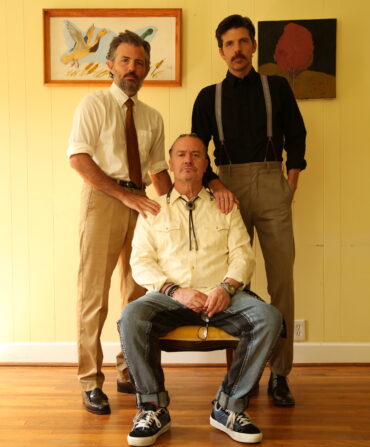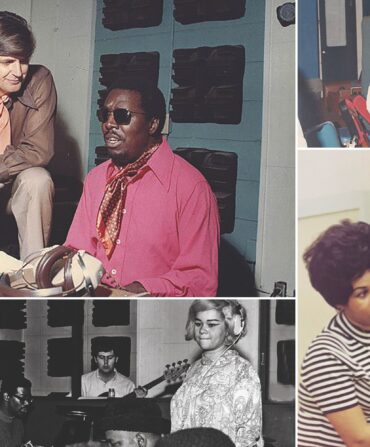Saint Cloud, the acclaimed indie-country fourth album from Kansas City-based Waxahatchee, arrived like a salve in March 2020. In those uneasy early days of COVID, as institutions began to shutter and the world as most knew it became a virtual experience, the eleven-song cycle’s breezy confidence and gentle strength was a reminder that despite this collective unraveling, spring was just around the corner.

Birmingham, Alabama, native Katie Crutchfield, the artist behind Waxahatchee, had been there before. As her alcoholism reached its nadir while touring 2017’s Out in the Storm, she chose to shutter her own world in order to relearn how to live and love as a sober twentysomething. Instead of weighing her down, though, the revelations of Saint Cloud catapulted her out of the insular world of indie rock to a broader audience ready to shake its own anxieties.
Four years and one pandemic later, Waxahatchee’s Tigers Blood, out today, arrives as not merely a bookend to the early 2020s, but also a signifier of Crutchfield’s resilience. “I think there is this very natural inclination to totally reinvent yourself, especially after you’ve had a big success,” she says, “and ultimately, the confident choice was to not do that. The confident choice was to approach it in a similar way and listen to what was inspirational to us in that moment.”
Like its predecessor, the songs on Tigers Blood unfold with an unhurried ease. Crutchfield and collaborator MJ Lenderman evoke a Gram Parsons–Emmylou Harris duality on the banjo-accented love song “Right Back to It,” while “Crowbar” sparkles with chiming guitars that recall both R.E.M. and Vic Chesnutt without yielding a scrap of her own identity. On the eve of the release of Tigers Blood, we caught up with Crutchfield to chat about what inspired her latest record.

Around the time you started writing Tigers Blood, you went on tour with Jason Isbell and Sheryl Crow. How did the experience inspire you?
I love Sheryl, and I was thinking about a few of her bigger songs. In a time where the landscape was so crazy, and it was peak bubblegum pop, she was able to write these great songs that totally stand the test of time. With Jason, we come from such a similar background, and with his time struggling with substances, to see him living his best, healthiest life and writing his best songs and achieving the highest success that he’s ever achieved, it’s just an amazing arc. Who wouldn’t be inspired by that?
Do you have literary touchstones for lyrics and themes? I mean, your earlier band was called P.S. Eliot.
Exactly—I think people called us “English-major core” [laughs]. I was reading a lot of plays in COVID just out of boredom. [Beth Henley’s] Crimes of the Heart is a play about three sisters in Mississippi, and I have a song called “3 Sisters” [on Tigers Blood], and Three Sisters is also a play by Chekhov. I’m one of three sisters, and a lot of the songs are about familial relationships, and so I took a lot of inspiration from Crimes of the Heart. I referenced David Foster Wallace’s “This is Water” speech—which is something I go back and listen to maybe twice a year—in the song “Ice Cold.” There are things about him as a human and definitely his approach to being an artist that I think are cool and identify with. I don’t know if anyone will pick up on this, but it’s fun for me.
Your songs have a strong sense of place. How often do you get back to Alabama?
I love it there. I think if I lived in New York or L.A. or a really huge, bustling coastal city, there would be a lot of stuff I really missed about it. But because I live [in Kansas City], somewhere that’s not actually that different from Birmingham or from Alabama, I kind of am able to scratch the itch of the trees and the nature and the friendly energy. But I think I just miss the feeling of, “This is my home. This is where I’m from.” I think Alabama will always be a big part of the larger world I’m building and about the stories I’m trying to tell.
Other than being the best snowball flavor, what is the significance of the title Tigers Blood?
That’s really it. It’s so funny, for the last two records, I have titled them based on something the title evokes, not because it has a deeper meaning. So with Tigers Blood, I was writing this lyric about childhood and innocence and summertime, and that just fell out of my mind, and I clocked it and was like, “I’m going to definitely title the song that.” And then when I was trying to figure out what I was going to call the record, it just kept kind of speaking to me. I like the fact that it feels a little more intense than it is—it’s such an innocuous and innocent thing, and yet it does evoke something.
Listen to Tigers Blood, out now.








